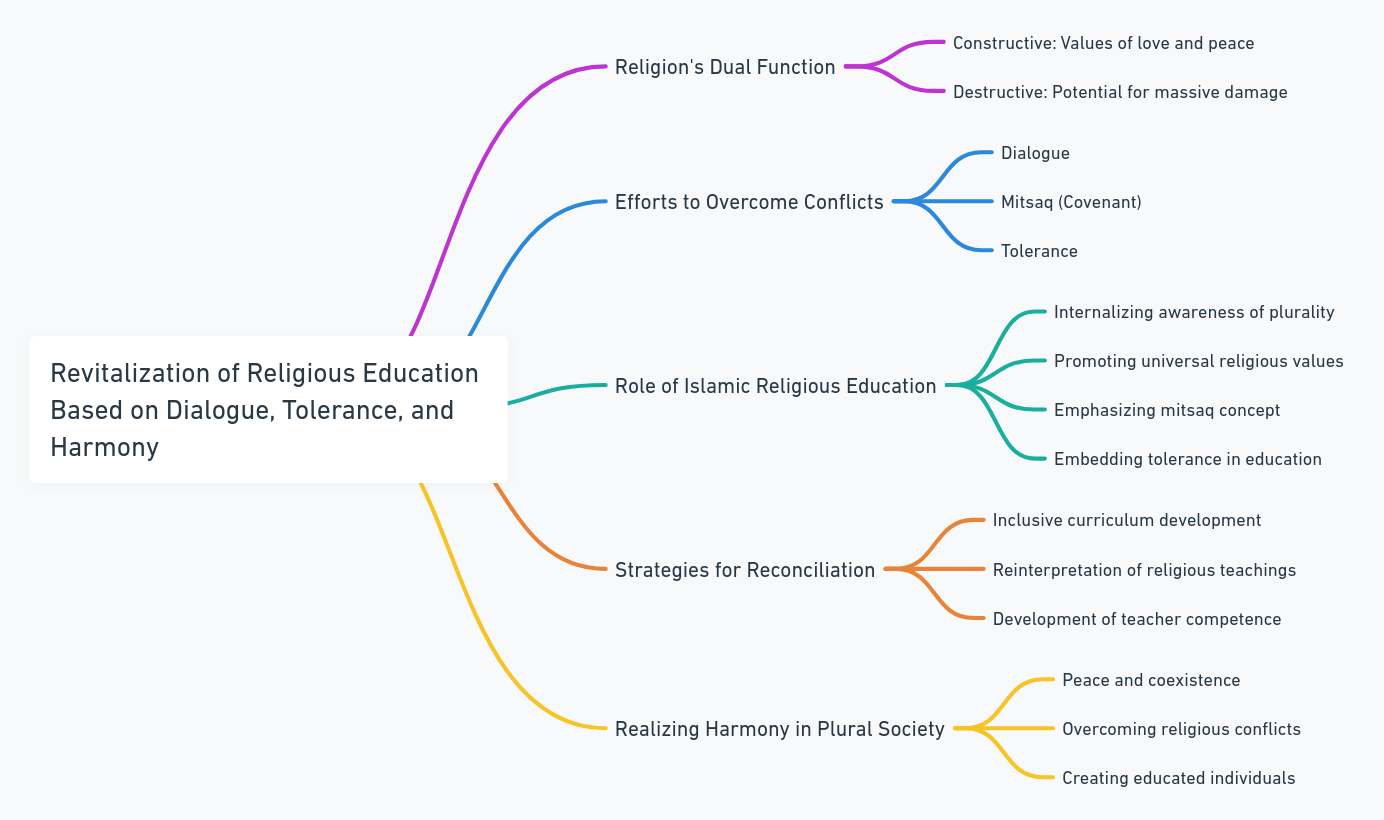Revitalization of religious education based on dialogue, tolerance and harmony of religious people in Indonesia
DOI:
https://doi.org/10.26555/almisbah.v12i2.10853Keywords:
Religion, Dialogue, Mistaq, Tolerance, Islamic educationAbstract
From a sociological perspective, religion is considered to have a dual function. On the one hand, it is constructive by embodying the values of love and peace. On the other hand, it is destructive which results in massive damage. One of the efforts to overcome conflicts between multi-religious communities is the effort of dialogue, mitsaq and tolerance. Islamic religious education is one of the mediums in realizing this aspect. By internalizing the awareness of plurality, dialogue efforts by seeking universal religious values, explaining the concept of mitsaq and internalizing the values of tolerance in education, reconciliation efforts against religious conflicts are expected to run effectively so that harmony between religious communities in Indonesia is realized.
References
Abdur Rouf Hasbullah. (2022). KonstruksiNilai-Nilaidalam Peristiwa Fathu Makkah. Indonesian Journal of Humanities and Social Sciences, 03(02), 165.
Anis Malik Thoha. (2005). Tren Pluralisme Agama : Tinjauan Kritis. Perspektif.
Arifuddin Ismail. (2010). Refleksi Pola Kerukunan Umat Beragama (Fenomena Keagamaan di Jawa Tengah, Bali dan Kalimantan Barat). Jurnal Analisa, 17(02), 175.
As-Sirjani, R. (2014). Sumbangan Peradaban Islam Pada Dunia. Pustaka Al Kautsar.
Azra, A. (1999). Konteks Berteologi Indonesia Pengalaman Islam. Paramadina.
Bagus Purnomo. (2013). Toleransi Religius,Antara Pluralisme dan Pluralitas Agama dalam Perspektif Al-Quran. Suhuf, 06(01), 85.
Bakar, A. (2015). Konsep Toleransi dan Kebebasan Beragama. TOLERANSI: Media Komunikasi Umat Bergama, 07(02), 123.
Bakar, A., Sultan, U., & Riau, S. K. (2015). Konsep Toleransi dan Kebebasan Beragama (Vol. 7, Issue 2).
Burhan Bungin. (2001). Metodologi Penelitian Kualitatif: Aktualisasi Metodologis Ke Arah Ragam Varian Kontemporer. Rajagrafindo Persada.
Difa’ul Husna, Yazida Ichsan, U. H. S. (2021). Tolerance in Islam Historical Perspective of Khulafaur Rasyidin’s Period and Its Contribution to Islamic Education. At-Tarbiyat: Jurnal Pendidikan Islam, 04(03), 513.
Dwi Maryani Rispatiningsih. (2019). Makna kerukunan dan toleransi dalam perspektif agama Islam dan agama Buddha. Jurnal Pendidikan, Sains Sosial Dan Agama, 05(08), 113.
Farhan, H. W. (2023). Pengembangan Materi Pembelajaran PAI Berbasis Toleransi. AL-ULUM JURNAL PENDIDIKAN ISLAM, 04(03), 380.
Fitria Izzah Dinnillah. (2022). Studi penafsiran mîtsâqan ghalîzha dalam tafsir fî zhilâlil qur’an study on interpretation of mîtsâqan ghalîzha in fî zhilâlil qur’an. Al-Karima, 01(02), 41.
Gustia Tahir. (2016). Pluralitas Makhluk Dan Keesaan Khaliq. Al-Adabiyah, 16(02), 161.
Husain Mu’nis. (2019). Sejarah Otentik Politik Nabi Muhammad SAW dari Dakwah Mekkah hingga Piagam Madinah,. Imania.
Imam Mashuri. (2020). Pembelajaran PAI berbasis multikultural dalam rangka toleransi umat beragama. Edupedia, 04(02), 96.
Imas Setiyawan, E. A. H. (2018). Dialog Antar Umat Beragama Sebagai Piranti Menumbuhkan Sikap Toleransi. Al-Mada; Jurnal Agama, Sosial Dan Budaya, 01(01), 62.
Jamrah, S. A. (2015). Toleransi Antarumat Beragama: Perspektif Islam. Jurnal Ushuluddin, 23(2).
Kiki Mayasaroh, N. B. (2020). Strategi dalam membangun kerukunan antarumat beragama di Indonesia. Al-Afkar, Journal for Islamic Studies, 03(01), 78–79.
Kuntowijoyo. (2006). Islam Sebagai Ilmu. Tiara Wacana.
M Amin Abdullah. (2019). Fresh Ijtihad Manhaj Pemikiran Keislaman Muhammadiyah di Era Distrupsi. Suara Muhammadiyah.
M. Khoiril Anwar. (2018). Dialog antar umat beragama di Indonesia perspektif A.Mukti Ali. Jurnal Dakwah, 19(01), 100.
Mahathir Muhammad Iqbal. (2014). Pendidikan multikultural interreligius: upaya menyemai perdamaian dalam heterogenitas agama perspektif Indonesia. Sosio Diikdatika, 01(01), 89.
Mahmud Arif. (2012). Pendidikan agama Islam inklusif-multikultural. Jurnal Pendidikan Islam, 01(01), 11.
Masykuri Abdillah. (2020). Aktualisasi Islam dan KeindonesiaanDalam Koteks Ideologi Negara Pancasila. Himmah, 04(01), 263.
Matroni. (2022). Epistemologi ukhuwah sebagai falsafah pemikiran Islam. Fahima: Jurnal Pendidikan Dan Kajian Keislaman, 01(02), 32–33.
Mumin, A. U. (2018). Pendidikan Toleransi Perspektif Pendidikan Agama Islam (Telaah Muatan Pendekatan Pembelajaran Disekolah). Al-Afkar: Journal For Islamic Studies, 2(1), 15–26. https://doi.org/10.5281/zenodo.3554805
Noeng Muhajir. (1989). Metodologi Penelitian Kualitatif. Rake Sarasin.
Priatmoko, S. (2018). Pengarusutamaan nilai-nilai Islam moderat melalui revitalisasi pancasila dalam pendidikan Islam. 734–735.
Ridho Dinata Iain Smh Banten, M. (2012). Konsep toleransi beragama dalam tafsir al-Qur’an tematik karya tim Departemen Agama Republik Indonesia. ESENSIA, XIII(1), 87.
Ruslan Ibrahim. (2008). Pendidikan Multikultural : Upaya Meminimalisir Konflik Dalam Era Pluralitas Agama. El-Tarbawi, 01(01), 117.
Sandy Nur Ikfal Raharjo. (2015). Peran identitas agama dalam konflik di Rakhine Myanmar tahun 2012–2013. Jurnal Kajian Wilayah, 06(01), 37.
Stev Koresy Rumagit. (2013). Kekerasan dan diskriminasi antar umat beragama di Indonesia. Lex Administratum, 01(02), 58.
Yoshy Hendra Hardiyan Syah, R. W. (2023). Narasi Konflik Antar Agama-Agama Besar Dunia. Hanifiya: Jurnal Studi Agama-Agama, 06(02), 134.
Yunus, F. M. (2014). Konflik agama di Indonesia problem dan solusi pemecahannya. Substantia: Jurnal Ilmu-Ilmu Ushuluddin, 16(2), 217–228.

Downloads
Published
How to Cite
Issue
Section
License
Copyright (c) 2024 Yazida Ichsan, Sangkot Sirait, Mahmud Arif

This work is licensed under a Creative Commons Attribution-ShareAlike 4.0 International License.
Authors who publish with Al-Misbah agree to the following terms:
- Authors retain copyright and grant the journal right of first publication with the work simultaneously licensed under a Creative Commons Attribution License (CC BY-SA 4.0) that allows others to share the work with an acknowledgment of the work's authorship and initial publication in this journal.
- Authors are able to enter into separate, additional contractual arrangements for the non-exclusive distribution of the journal's published version of the work (e.g., post it to an institutional repository or publish it in a book), with an acknowledgment of its initial publication in this journal.
- Authors are permitted and encouraged to post their work online (e.g., in institutional repositories or on their website) prior to and during the submission process, as it can lead to productive exchanges, as well as earlier and greater citation of published work.

This work is licensed under a Creative Commons Attribution-ShareAlike 4.0 International License.



